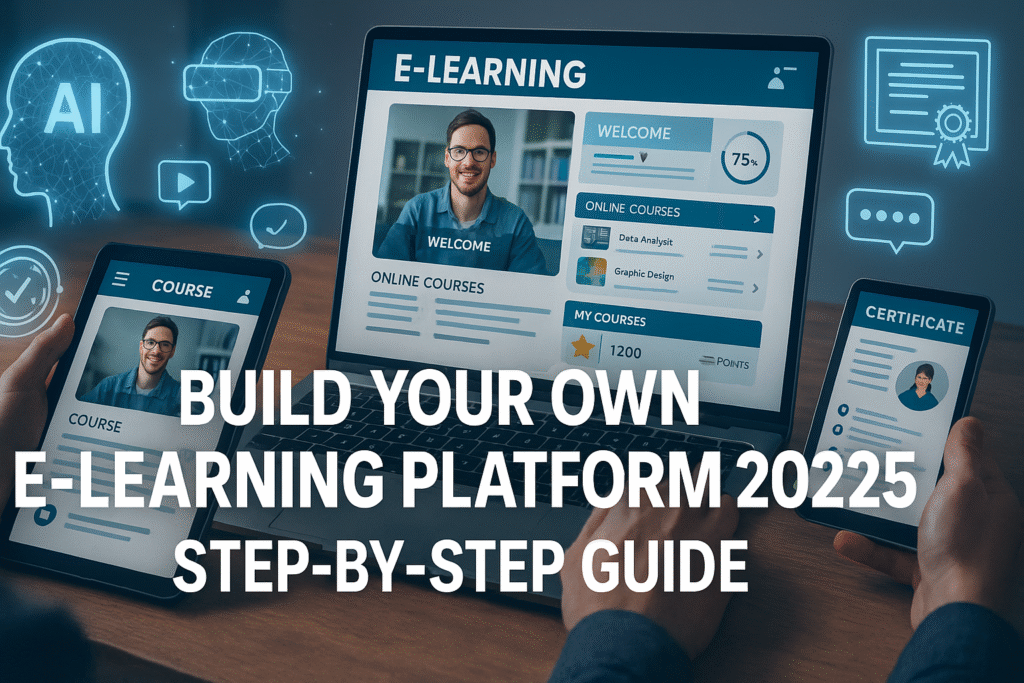Introduction: The E-Learning Revolution
By 2025, e-learning has transformed from a niche segment into a global educational powerhouse. With AI personalization, immersive VR/AR content, micro-certifications, and mobile-first experiences, online learning is now more accessible, engaging, and profitable than ever.
Building your own e-learning platform is no longer limited to tech giants. With platforms, tools, and AI-driven solutions, educators, entrepreneurs, and companies can create their own learning ecosystems to deliver courses, certifications, and interactive experiences.
This step-by-step guide will walk you through building your own e-learning platform in 2025, covering everything from planning and tech stack selection to marketing and scaling.
🔹 Step 1: Define Your Vision & Niche
Before development, define the purpose and target audience of your e-learning platform.
Key Considerations:
- Identify Your Audience
- Professionals, students, hobby learners, corporate teams, or niche learners.
- Choose a Niche or Focus
- Examples: AI & tech, business skills, creative arts, language learning, or corporate training.
- Determine Platform Goals
- Monetization through subscriptions, course sales, corporate packages, or freemium models.
- Delivering certifications, micro-degrees, or skill-based learning.
- Competitor Analysis
- Analyze platforms like Coursera, Udemy, Skillshare, and emerging AI-driven platforms.
- Identify gaps and opportunities for differentiation.
🔹 Step 2: Decide on Platform Type
Depending on your goals, select the type of platform:
- Self-Paced Learning Platform
- Learners progress at their own pace.
- Examples: Udemy, Skillshare.
- Instructor-Led / Live Learning Platform
- Real-time classes with schedules and live interaction.
- Examples: MasterClass Live, corporate webinars.
- Hybrid / Microlearning Platform
- Short, interactive modules with AI recommendations.
- Ideal for professionals and mobile learners.
- Corporate Training LMS
- Enterprise Learning Management System for employee upskilling.
🔹 Step 3: Plan Your Content & Curriculum
Content is the heart of any e-learning platform.
Steps for Content Planning:
- Course Structure
- Break topics into modules, lessons, quizzes, and assignments.
- Add practical projects and case studies.
- Content Formats
- Videos, PDFs, slides, podcasts, interactive simulations, VR/AR modules.
- AI-Enhanced Learning
- Use AI for personalized recommendations, adaptive quizzes, and progress tracking.
- Certification & Assessment
- Issue digital certificates, badges, or micro-degrees after course completion.
🔹 Step 4: Choose the Right Tech Stack
1. Custom Development
- Full control over design, features, and scalability.
- Use React or Angular for frontend, Node.js or Django for backend, and AWS or Google Cloud for hosting.
2. SaaS / White-Label LMS Platforms
- Quick launch without heavy coding.
- Examples: Teachable, Thinkific, Kajabi, LearnWorlds.
3. Key Features to Include
- User dashboards and profiles
- Course library and search
- Payment gateway integration
- AI-powered recommendations
- Analytics and reporting
- Community features: forums, discussion boards, chats
🔹 Step 5: Design UI/UX for Engaging Learning
User experience is critical for retention.
UI/UX Tips:
- Mobile-First Design
- 60–70% of learners access platforms via mobile devices.
- Intuitive Navigation
- Easy-to-access courses, modules, and progress tracking.
- Gamification & Engagement
- Badges, points, leaderboards, and achievement tracking increase motivation.
- Accessibility
- Multi-language support, captions, screen-reader friendly designs.
🔹 Step 6: Integrate AI & Automation
AI is a game-changer for e-learning in 2025.
Key AI Applications:
- Personalized Learning Paths
- Suggest lessons and courses based on user behavior and skill level.
- AI Tutors & Chatbots
- Answer learner questions, provide feedback, and offer hints.
- Performance Analytics
- Track engagement, completion rates, and weak points to improve courses.
- Automated Content Recommendations
- Recommend related courses or modules for upselling and retention.
🔹 Step 7: Implement Payment & Monetization Options
Monetization is crucial for sustainability.
Options:
- Subscription Model: Monthly or annual plans for unlimited access.
- One-Time Course Purchase: Lifetime access to a single course.
- Freemium Model: Free courses with premium upsells.
- Corporate Packages: Bulk access for companies.
Integrations: Stripe, PayPal, Apple Pay, Google Pay, or regional payment gateways.
🔹 Step 8: Market Your E-Learning Platform
Marketing is essential to attract and retain learners.
Strategies:
- Content Marketing
- Blogs, video tutorials, and webinars to attract organic traffic.
- Social Media Marketing
- Leverage Instagram, TikTok, LinkedIn, and YouTube for promotion.
- Email & SMS Campaigns
- Personalized course recommendations, promotions, and reminders.
- Affiliate & Influencer Marketing
- Collaborate with educators and industry experts to drive enrollments.
- SEO & Paid Ads
- Optimize course pages for search engines.
- Run targeted ads on Google, Facebook, and LinkedIn.
🔹 Step 9: Launch & Gather Feedback
- Beta Testing
- Launch a limited version to test usability, content, and tech.
- Collect User Feedback
- Surveys, reviews, and in-app feedback forms.
- Iterate & Improve
- Continuously refine courses, UX, and features based on feedback.
🔹 Step 10: Scale Your Platform
- Add More Courses & Instructors
- Expand your course library and bring in industry experts.
- Localization & Global Reach
- Multi-language support and region-specific content.
- Integration with Corporate & Academic Clients
- Offer B2B training solutions and partnerships with universities.
- Leverage Analytics & AI
- Track growth metrics, engagement, and user retention to make data-driven decisions.
🔹 Bonus Tips for 2025 E-Learning Success
- Gamify Learning: Quizzes, points, badges, and leaderboards.
- Immersive VR/AR Modules: Especially for healthcare, engineering, and vocational courses.
- AI-Powered Marketing: Personalized course recommendations and automated campaigns.
- Community Building: Encourage discussion forums, social groups, and mentorship programs.
- Sustainability & Accessibility: Eco-conscious course materials and inclusive design.
📊 Conclusion: Build, Launch, and Thrive
Building your own e-learning platform in 2025 is more accessible than ever. By combining:
- A clear niche and vision
- Engaging, AI-powered content
- Seamless user experience
- Effective monetization and marketing strategies
…any entrepreneur, educator, or company can create a successful, scalable learning ecosystem.
The future of e-learning is personalized, immersive, and globally accessible — your platform can be at the forefront of this revolution.


